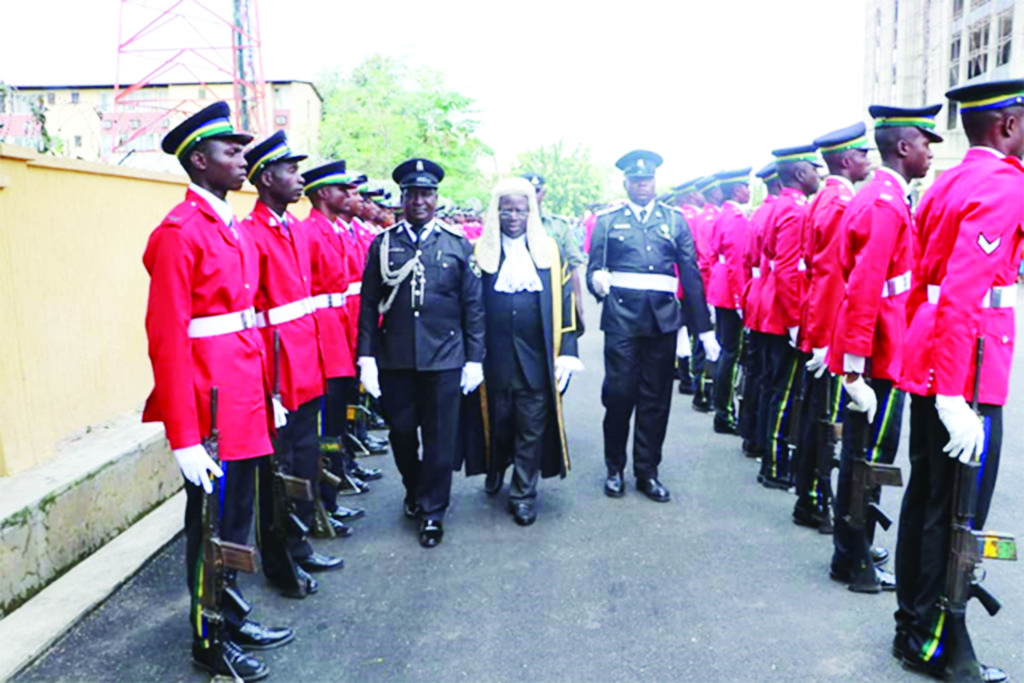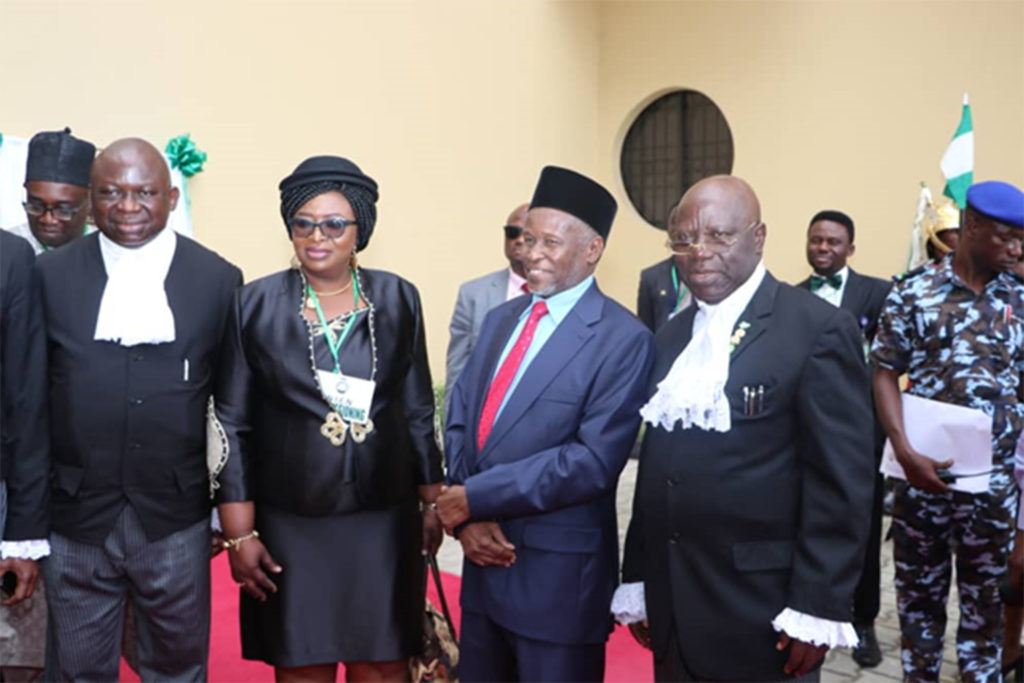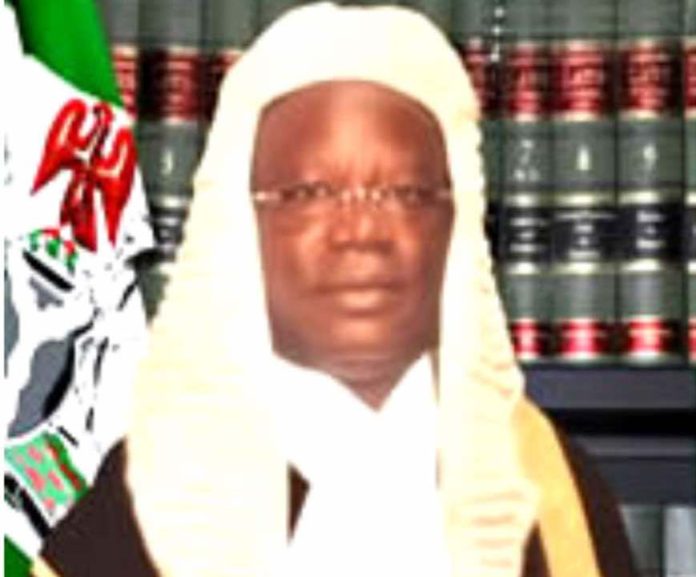As he heaved the head-pan of wet concrete on his head, climbing up and down the stairs of the new hotel under construction, little did the young labourer know that in a matter of years he would head a court adjudicating over matters concerning people like himself and more. It never crossed his mind that in 34 years with so much pomp, he would be ushered into a luxurious room in this very hotel where he was one of the many unknown manual hands that constructed it.
His father died three months before his birth. And so he was named Babatunde which in Yoruba language means the fa- ther has come back. Olaniyan Adejumo a driver was from Akunnu – Akoko, North East Local Government of Ondo State was brought up in Lokoja, old Kwara state and capital of present day Kogi state. The younger Adejumo, Babatunde Adeniran was born October Ist 1954. When his father died, his pregnant mum, Madam Awawu Giwa relocated back to her town, Ikaramu – Akoko, Akoko in North West Local government Area of Ondo State. He was eventually brought up by his mother’s relations. Though a very bright child, he was not opportune to attend secondary school. He went to live with his father’s childhood friend, Magistrate O.O. Saw- yer in his final year at primary school. Magistrate Sawyer enrolled him at St. Patrick’s Primary School, Ijebu Owo in the old Western Region, now Owo, Ondo State. On competing primary school, he was billed to attend Aju- wa Grammer School, Okeagbe, in Akoko, Ondo State. Unfortunately, the Magistrate’s wife opposed the Idea.
The Bricklayer
With the hopes of going to secondary school dashed, he saw no reason to remain with the Sawyers and so Young Babatunde went home. A glimmer of hope came when a cousin who lived in Lagos visited their home- town in 1969 and took him to Lagos. This cousin tried registering him at Government Trade Centre, Yaba but that too failed. Since education appeared not to be his lot, a relation that worked at Federal Palace Hotel in Vic- toria Island informed him that an annex of the hotel was under construction and that young men were earn- ing money carrying concrete and working as bricklayers. He didn’t hesitate. Every morning this relation, who worked as a Maintenance Officer at the hotel, rode with him on his motorbike from their Mushin abode to Victoria Island for the labourer work. “When they were building the annex of Federal Palace Ho- tel, I was one of those who did labourer there”, Justice.

Adejumo recalled. “One of my cousins was a Maintenance Officer there and he had a Suzuki. He would carry me on his motorcycle to the hotel where I joined other labourers to do bricklayer job. I carried sand, cement and did the general bricklayer’s work. When I became President of the National Industrial Court I went and booked that place for one week. I told those who went to book the hotel for me that I was one of the bricklayers that built that place and now I want to enjoy it.”
Life was so tough that young Adejumo traversed the most distant parts of Lagos on foot, eat eba with moi-moi (beans pudding) bits and peeped through a neighbour’s window to watch television. It was a struggle for survival. “In those days, they used only leaves to wrap moi-moi. When you begin to unwrap it, some moi-moi usually stick on the folds of the leaves. Those ones are very soft so we pick it out gently and use it to eat eba. Then the Cotonou people that sell ewa agoyin (mashed beans) will put pepper sauce in the middle of the ewa agoyin. You can use that sauce to eat eba. Some people sell soup without eba. It may be with kponmo (edible cow hide), thick round ones, not like the ones they sell these days. There will be pepper inside the folds of the kponmo so when you buy it with the soup, already you have garri, so you make eba and eat. “Those days you trek from Mushin to Race Course, Mushin to Bar Beach. Then you trek from Mushin to Ikeja, to Agege. There was no money. In a whole street there may be only one television. All of you will gather on the window. The day you offend the television owner’s child, he’ll pull down the curtain so you don’t watch.”
The Shoemaker
The future Hon. Justice Babatunde Adeniran Adejumo continued with his bricklaying job until an opportunity came for him to be an apprentice shoemaker near his residence at Mushin. After three years of learning, he completed his appren- ticeship in 1972 and went to Owo to ply his trade. He was at Owo from 1972 to 1975 when the Pris- on Service needed warder tradesmen. As a result, he went back to Lagos to enlist. In 1977 he was sent to the Prisons Training School, Ogbete Enugu, former East Central State for six months train- ing. Clinching the overall best student position out of 313 students, he received the baton of honour and overall best student award. Overwhelmed by his own success, he asked himself, “does it mean I can read?”
Another Attempt
His success at the Prison Training School buoyed up the desire to give education another attempt. On returning to his station in Abeokuta in 1978, he enrolled into the Teachers’ College where he met a senior, Mr. Azeez, now a chartered accountant. Azeez was always reading at night after light out, so Adejumo approached him and expressed his desire to learn. Sadly, when he started read- ing the books Azeez recommended, he couldn’t understand anything. Yet, the senior encouraged him to continue reading. In 1979, he wrote the external GCE and made had 4 credits and 2 passes including English and Mathematics. Friends ad- vised him to leave the College of Education since he’s obtained the O’Levels but he was determined to complete the Teacher Training. On acquiring his Teacher’s Grade II Certificate in 1981, Adejumo was posted to Olugbo Comprehensive High School, Odeda, Ogun State where he taught Economics, Government and Commerce. He was also preparing for A ‘Levels exams. In 1982, when the result was out he passed with distinction.
Favour
Thereafter, he applied for direct entry and was given admission to study Law in 1982 for 3 years at University of Ife, now Obafemi Awolowo University. He was 27 years old. All through the 3 years, he had only a pair of Jeans, one T-shirt, a Safari Suit, and one other outfit. His shoes were only two. A passed down stiletto and a pair of sandals Graduating in 1985, he proceeded to the Law School in Lagos. He was 30 years old after the LLB so he could not go for the mandatory National Youth Service. “When I graduated, I went to Law school in Lagos and joined the Law firm of Osuo- lala Ojo & Co., 208 Exam Success House Ikorodu Road, Palmgrove, Lagos thereafter, but they were not paying me. I’ll trek from Mushin to the office daily. I was there for 10 months and while my col- leagues were on Youth Service I got a car”, recalled Justice Adejumo. He revealed that an impressed client who initially urged him to buy his fairly new 504 SR at a discounted eventually gave him at no charge. As he was reeling over his good fortune, a friend he learnt shoemaking with gave him a four bedroom flat to live in at an extremely low rate. “He had built many houses in Lagos. I didn’t have anything. I bought a mat on the first day. He asked how much I wanted to pay for a year and I said N200 naira but that I will not pay rent for the first one year. He agreed. I hung my lawyer signboard so when the land owners saw it, they approached me. I sold half of the land in Ikotun Egbe, I made money and had two or three plots of land,” he recounted.
Politics
In 1991, Adejumo ran for election under the SDP for Ondo State House of Assembly. The party purchased his nomination form six weeks to the elec- tions and printed his posters without any financial contribution from him. He won the election and was further elected Chairman of the House Committee on judiciary, Human Rights and Public Petition. He served until 1993 when the Abacha regime displaced them.
Back to Law
Having worked closely with the judiciary, his Chief Judge persuaded him not to return to Lagos. In time, he was appointed Chief Magistrate. “After 13 months someone told me to apply to the Supreme Court as Deputy Chief Registrar (DCR). I applied. For one year I heard nothing. In between before I became a Chief Magistrate, Obasanjo called for a meeting at Ota. Buhari was there, I was there, the late Joe Garba, late Rimi and oth- ers were there. We were discussing June 12 and there I met with Buhari in 1993. I got his number and we started talking. “When this opportunity came, I got in touch and told him I applied to be DCR at the Supreme Court. He said I should bring a copy of my application to him in Lagos. When I gave him the application, he said he will give the copy to Justice Mohammed Bello who was the Chief Justice of Nigeria. We went for the interview. Two of us scaled through. I came first and Ishaq Bello the Chief Judge of the FCT came second. I was DCR 1, he was DCR II. He worked for two years and became a high court judge. I worked for three years and became a high court judge. I was a High Court judge for five and half years in Ondo State Judiciary.
“When the opening for President of the National Industrial Court came, I approached my CJN, Justice Uwais but he discouraged me and said that place was a dead end. I said someone must make a dead end a living end and he said ok. I informed my Chief Judge in Ondo State and he recommended me. When my appointment was announced, Kanyip phoned me. He was my classmate at the law school. He said ‘congratulations. The President has appointed you as President of NIC and I too showed interest but now you’ve been appointed, I pledge my loyalty to you…” That was the bond.

and wife of Justice Adejumo, Hon. Justice Abimbola O. Obaseki-Adejumo,
Chief Justice of Nigeria, Dr. Justice Tanko Mohammed and Hon. Justice B. A.
Adejumo
As President of the National Industrial Court from 2003 to 2019, Hon Justice Adejumo will be will remembered for his invaluable contributions to the court. “During my tenure the Constitution of The Federal Republic of Nigeria was amended by The Third Alteration to give birth to NICN as Su- perior Court of Record in Nigeria and the number 4 Court of Record under our Constitution today. Alhamdullilahi. The rest is a story.” His lordship concludes that much as he been extremely lucky in life, hard work and destiny cannot be ruled out.





